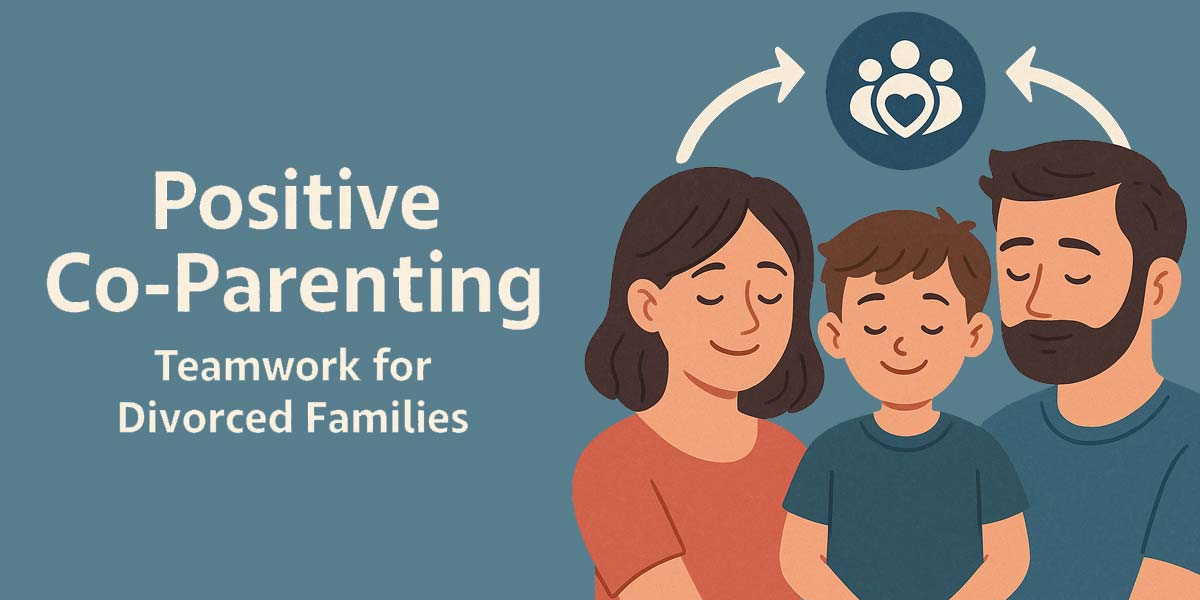
Positive Co-Parenting: Teamwork for Divorced Families
Co-parenting after a divorce can feel overwhelming. Different schedules, parenting styles, and emotions can easily get in the way. But with the right approach, teamwork in co-parenting can become your greatest strength.
This guide will show you how Positive Parenting principles—like those taught by James A. Baker—can transform co-parenting from a struggle into a partnership that benefits your child above all.
What Is Co-Parenting?
Co-parenting means sharing the responsibilities of raising your child after separation or divorce. It's not about your relationship with your ex-spouse—it's about creating a cooperative environment where your child feels supported, secure, and loved by both parents.
The Challenges of Co-Parenting After Divorce
Divorce often brings emotional baggage, misunderstandings, and new life circumstances. These can make co-parenting difficult. Common challenges include:
- Poor communication between parents
- Conflicting parenting styles
- Scheduling conflicts and logistics
- Emotional strain and unresolved resentments
Recognizing these hurdles is the first step toward overcoming them.
Positive Parenting: A Foundation for Co-Parenting Success
James A. Baker's Positive Parenting focuses on empathy, respect, and proactive communication—all essential for effective co-parenting. Rather than focusing on control or conflict, Positive Parenting encourages parents to work together as a team for the well-being of their child.
Core Principles of Positive Co-Parenting
- Child-Centered Focus: Every decision revolves around what’s best for the child’s emotional and developmental needs.
- Respectful Communication: Maintain a tone of respect, even when disagreements arise.
- Consistency Across Homes: Align on basic rules, routines, and expectations to provide stability.
- Flexibility and Cooperation: Be willing to adjust plans for the sake of your child’s needs.
- Conflict Resolution Skills: Focus on solutions, not blame, when addressing disagreements.
The Symphony of Co-Parenting Teamwork
Think of co-parenting as playing in a symphony. Both parents are musicians with their own instruments, but the goal is to create harmony for the child. This doesn’t mean you have to be best friends with your ex—but it does require coordination, practice, and mutual respect.
Here’s how you can build that teamwork:
1. Establish Clear Communication Channels
Decide how you'll communicate—whether it's through texts, emails, or a co-parenting app. Keep messages clear, factual, and child-focused. Avoid emotional venting or rehashing past conflicts.
2. Create a Unified Parenting Plan
Work together to develop a parenting plan that outlines custody schedules, decision-making responsibilities, and guidelines for discipline. Consistency is key to reducing confusion and providing stability for your child.
3. Respect Each Other’s Role
Both parents bring unique strengths to the table. Acknowledge and respect each other’s contributions. Your child benefits most when both parents are actively involved and supportive.
4. Practice Emotional Self-Regulation
It’s normal to feel frustration, but Positive Parenting encourages managing your emotions before addressing conflicts. Take a breath, focus on the bigger picture, and choose your battles wisely.
5. Celebrate Small Wins
Every time you and your co-parent successfully navigate a challenge together, acknowledge it. These small victories build trust and reinforce the value of teamwork.
The Child’s Perspective: Why Co-Parenting Teamwork Matters
Children thrive in environments where they feel loved and secure. When divorced parents work as a team, it reduces the child's anxiety and prevents feelings of being caught in the middle. Positive Co-Parenting teaches children valuable life lessons about respect, cooperation, and problem-solving.
How Online Parenting Classes Can Help
Building effective co-parenting skills takes practice, guidance, and sometimes a little help. Our Online parenting classes are designed to support divorced parents in mastering Positive Parenting techniques, improving communication, and fostering a child-centered co-parenting approach.
Take the Next Step: Strengthen Your Co-Parenting Team
Co-parenting doesn’t have to be a constant battle. By embracing Positive Parenting principles and committing to teamwork, you can create a healthier, happier environment for your child.
Enroll in our Online Parenting Classes today and start building a co-parenting partnership that truly works—for you, your ex, and most importantly, your child.